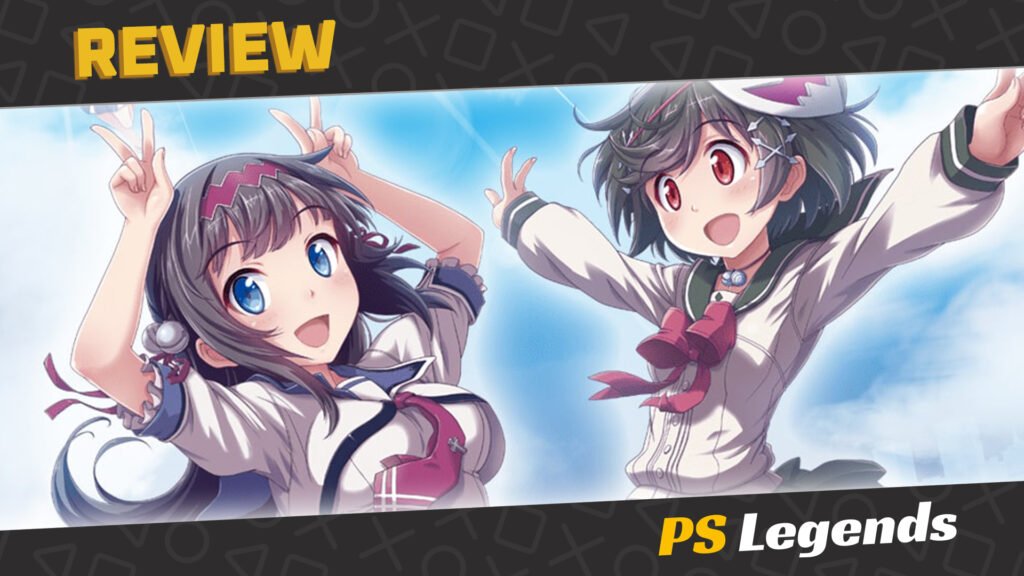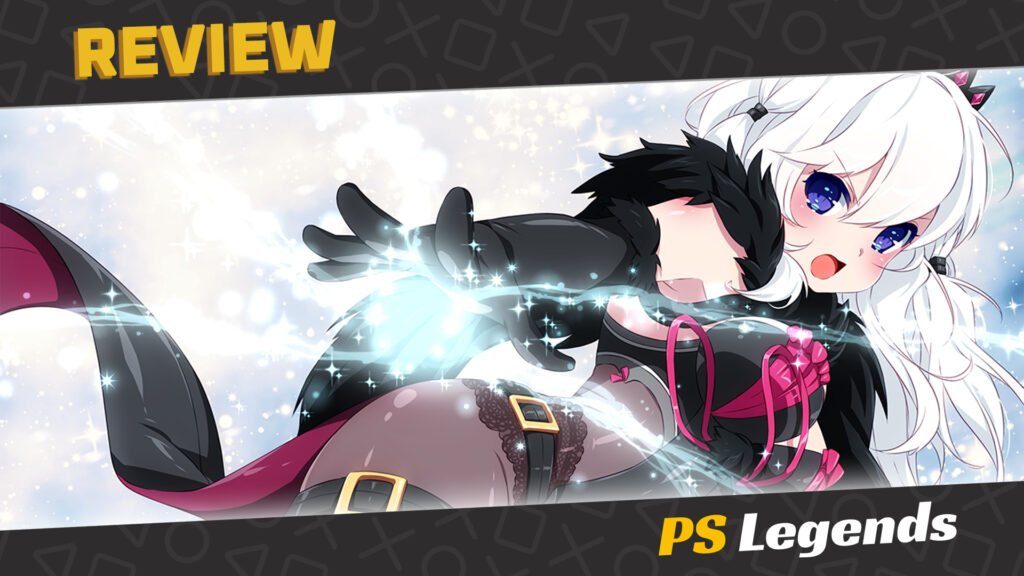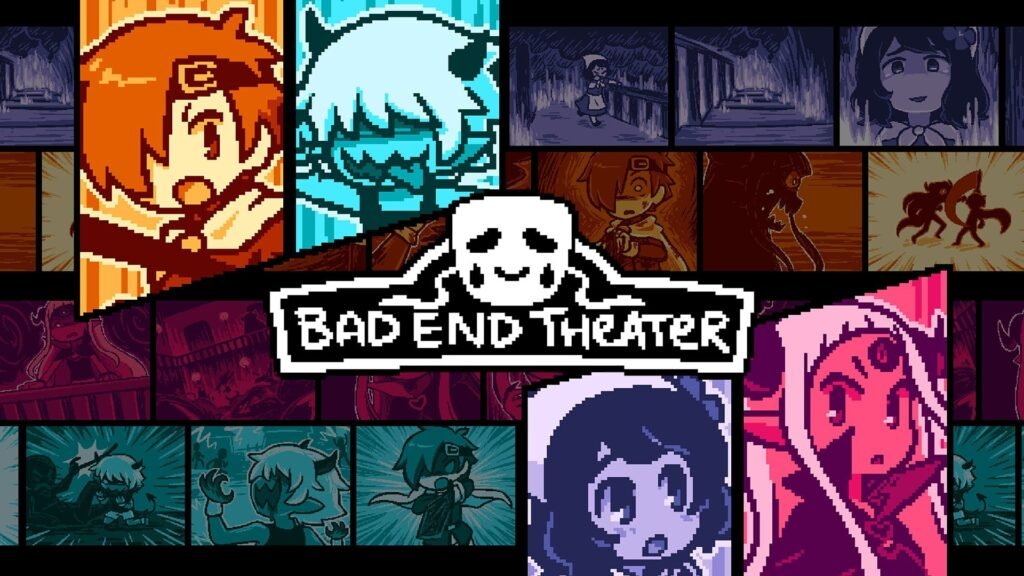I’m often asked when I’ll be tackling my next controversial game, and honestly I don’t need much convincing to jump at the chance to review another. From Senran Kagura, Blue Reflection and even an assortment of old PC hentai games, I’m never short of edgy games to review, not because there are many of these risqué fan-service games available, but because few reviewers are brave enough to venture into controversial territory. Fortunately, I’m not most reviewers.
Being a free-spirited modern hippie-type means we’re not going to see eye to eye if you’re the type who finds teen dating and expressionism offensive, in which case, you’re in the wrong place if you’re looking for the beauty in games like Gal*Gun, while us free-loving liberal types will immediately see the appeal of games which flaunt coming-of-age first-loves and the stirrings of sexual awakenings as representations of our own awkward teenage years, with a splash of fantasy-fulfilment thrown in for good fun.

Introduction
Gal*Gun: Double Peace is a rail shooter ‘bishōjo’ (pretty girl dating) game developed by Inti Creates. The game was released on PlayStation 4 and PlayStation Vita in Japan in August 2015, Europe in July 2016, and North America in August 2016. It is the successor to the 2011 game, Gal*Gun, and is similar to its predecessor, mirroring many events from the original story albeit with a new cast of characters.
The international release of the game was published by PQube. The company promised the game would be uncensored from the original Japanese product, remaining completely intact, a rarity for a game of this type, and an appreciated gesture for those who respect authenticity and artistic vision. Seriously, well done.
The game was widely available in various chains throughout Europe, but North America saw a limited release, exclusive to VGP.ca for Canada and Amazon.com for the United States. Rice Digital primarily handled the British sales, offering both a standard edition and a collectors edition, titled the ‘Mr Happiness’ edition. This set includes a wall scroll, artbook, soundtrack, bonus downloadable content, and a fun screen duster in the shape of female underwear.
With the first game in the series unreleased in the west, Gal*Gun: Double Peace launched to some fanfare as a rare ‘wish fulfilment’ game and gained some moderate interest and retailer advertising. This would also prove problematic for UK-based Japanese games specialist Hitari, who (allegedly) were offering free copies of the game for those who pre-ordered early, only to cancel all relevant pre-orders citing ‘human error’. Hitari has since ceased trading. Who knew such a quirky game had such an equally quirky backstory?

Story
The game takes place in the fictional Japanese high school, Sakurachi Academy. A student ‘cupid’ angel, Ekoro, has to strike a student with a love arrow during her exam, which will help the student find true love. The target is protagonist Houdai Kudoki, an unpopular male student at the academy. However, Ekoro notices that Kurona, a student demon girl who is also doing a practical exam, has the same intended target.
In an effort to strike the target first, Ekoro accidentally increases the dose of the arrow by thirty-two times the original intended amount. This makes every girl at the school grow madly in love with Houdai, frantically running after him in an effort to claim him as their lover. At the same time, Kurona begins striking girls with her staff, which makes the girls express their love for Houdai via the act of aggressive ‘crush bullying’. Due to the unintended side effect caused by the increased dose of the shot, Houdai will face a life alone if he doesn’t find his one true love before sunset.
The sisters, Shinobu and Maya, who are the students at the academy and childhood friends of Houdai are also involved. They aren’t affected by Houdai’s curse due to their secret profession as trained demon hunters. The sisters spend the game hunting Kurona, while also rekindling their bonds with Houdai whom they have not seen in three years. The game features branching paths and multiple endings depending on the player’s choices in regards to Houdai’s romantic interests.

Gameplay
Gal*Gun: Double Peace is both a rail shooter and a bishōjo game. The player fends off waves of female classmates using the pheromone shot, a power granted to protagonist Houdai from Ekoro. If the player shoots a girl, the pheromone shot will give them ‘euphoria’, subduing them in the process, thus preventing them from confessing their love that will damage Houdai’s HP if they succeed. The player may use the analog stick to shoot the classmates by freely moving the reticule around the screen.
Specific sections will also require the use of touches or swipes. This is done via the PlayStation 4’s touchpad on the controller, or the screen on the Vita. ‘Doki-Doki Mode’ makes a return, effectively breaking up the gameplay by triggering a screen-clearing minigame. Kurona’s cursed girls are more difficult to subdue, requiring the player to first shoot a mini demon that hovers around the infected girl before she may be hit with a pheromone shot.
Let’s break down the jargon before we go on. Someone has to do it. Stunning each girl into submission with your pheromone shot causes them to blush and drop to their knees, immobile for the remainder of the sequence. The games describe this incapacitation as ‘euphoria’ which is an accurate description, but let’s not sugarcoat the fact that you’re actually giving dozens of girls orgasms, and doing so in Doki-Doki mode allows you to target their, erm, more sensitive places which can grant them ‘Double Peace’. I’m sure you can figure out this phenomenon for yourselves.
Holding down the right shoulder button allows the player’s reticule to be zoomed in, with the left shoulder button serving as a method of slowing down the action momentarily. Both of these serve as a means of gaining the player a more accurate shot. Zooming in also allows the player to see through walls and other objects. Items such as character profiles, costumes or other school girls to subdue can be found hiding behind certain walls in preparation for a future ambush. You can gain an advantage here.

The academy shop is open to the player. It is run by Aoi, a female musician at the school who isn’t affected by Houdai’s cupid condition. Items here can be purchased, including increased player stats, more powerful shots and new camera angles for Doki-Doki mode. Donations can also be made to Aoi, which will unlock her own secret ending if enough are made. All currency is gained by completing levels or specific requests from other students. These requests can be viewed in between levels, and are usually completed by collecting a certain hidden item within a stage.
There are over seventy girls in the game, all of which can message Houdai once they’ve calmed down after receiving his pheromone shot. From Houdai’s phone, these girls may continue to flirt with him, attempt to reconcile their friendships or even make specific requests, such as locating items in levels which act as side-quests of sorts.
The game features branching paths and dialogue trees. The differing routes allow the player to select what stage they’d like to play next from an ordered list. In order to play stages which the player passed on, a new game must be started. The dialogue choices range from statements of love to perverted remarks, and these all allow the player to either strengthen a girl’s affection for Houdai or weaken it, depending on her tastes and what comment was made.
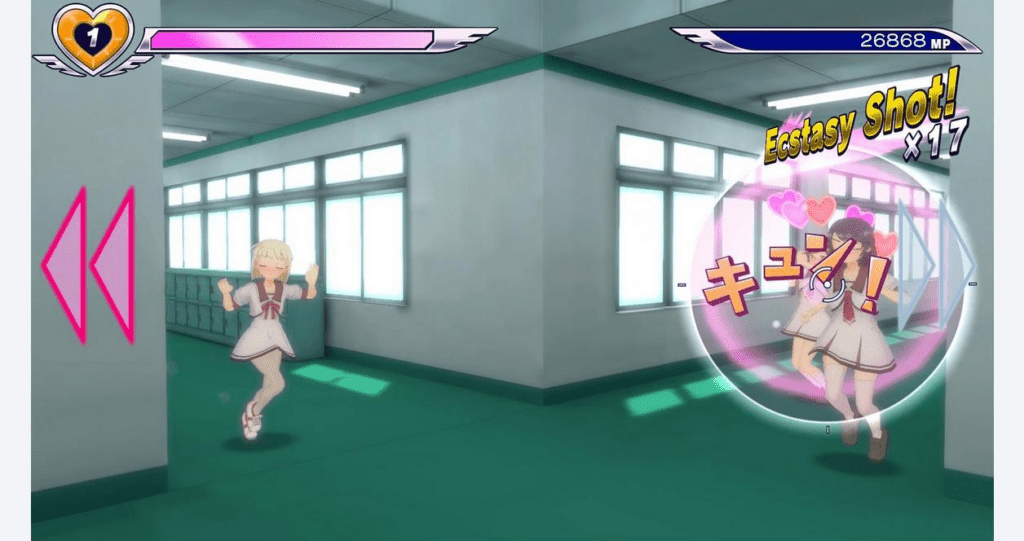
Graphics/Sound
Visually, the game looks surprisingly good for a lower-budget title. Every character has a 3D cel-shaded model throughout the game which is maintained during cutscenes rather than switching to 2D alternatives. All the girls look great and while the same girls will try again to grab Houdai in later levels, everyone looks identifiably different, and yes, they’re all cute in their own way.
Environments are also pleasing to look at and clearly take inspiration from anime series with high school settings, though you will occasionally stumble across an oddly-designed object which looks a little janky, such as a statue or a car, though these aren’t common occurrences. Menu screens are all bright and girly which makes them easy to navigate. You can also view the girls you’ve encountered in Gallery Mode. This mode features some very pretty full-screen images of the girls, some of which are revisits to story events, while others are lewd images featuring the girls in compromising situations.
The girls are all expertly voiced in Japanese only with subtitles. This does bring a certain authenticity to the game but also means that western players may miss out on some of that mid-action banter. The lighthearted music is enjoyable and surprisingly catchy, bringing a certain anarchic yet girly quality to the action.
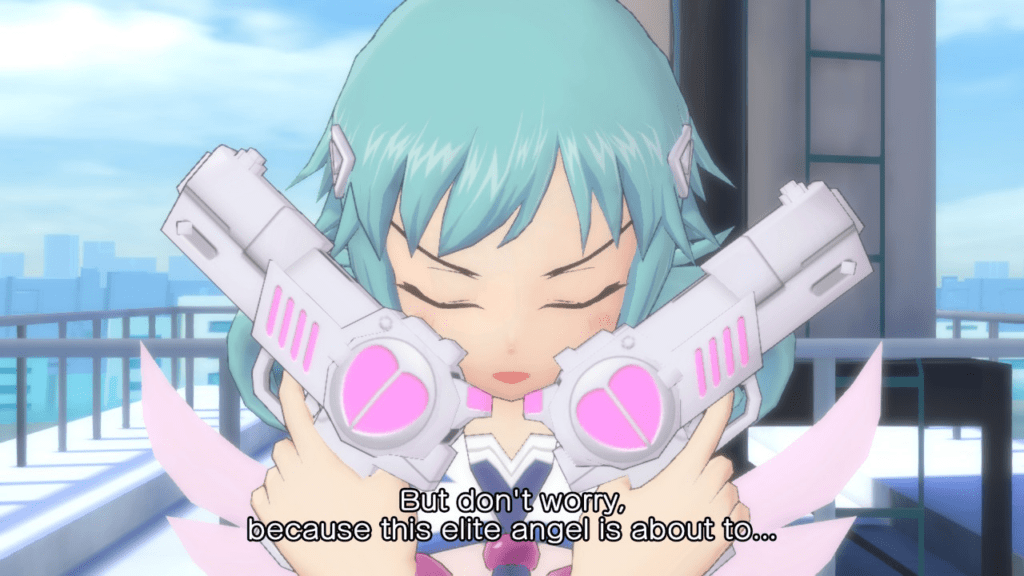
Replayability/Trophies
The replayability of Gal*Gun: Double Peace is key in exploring everything the game has to offer. There aren’t really any proper chapter select options and so you’ll need to start a new game to follow a different route and pursue romance with a different girl, of which there are several available, some requiring specific dialogue choices to unlock deeper interactions, while others have more secretive or unusual requirements.
What this means is that you’ll need to make multiple full playthroughs to see everything. Fortunately, each playthrough is only around two hours long, and you’ll need every playthrough you can get to give you the chance to find every collectible hidden in each stage. To unlock everything, you’ll need to find every student ID card, ‘shoot’ every girl including some hidden characters, and do so in each available costume. A guide is highly recommended if you want that platinum trophy.
While a couple of playthroughs of this simple shooter can be immensely fun, the same can’t be said when you’re working through your fourth or fifth run, and even then you’ve still got a hefty bit of collectible hunting to do. A guide will certainly help keep you on the right path for getting specific endings, but there’s no trimming that playtime if you want to complete your collection and grab the platinum. Expect playthroughs numbering the double-digits and over 25 hours of playtime for total mastery.

Conclusion
Gal*Gun was always going to get a few odd looks here and there, yet those who take a moment to process this fusion of realistic Japanese dating culture combined with anime-trope-inspired narratives will soon see how harmless and surprisingly charming the game is. Clearly New Zealand didn’t give the game that much thought since they were worryingly quick to ban the game, deeming the game “objectionable”, “relentless” and citing the “sexualization of underage [sic] schoolgirls”, which clearly they aren’t. Do your homework, FVLB.
There’s a certain wish-fulfilling quality to Gal*Gun which triggers flashbacks to my own teenage years and I’m sure most other hot-blooded males out there who wanted nothing more than to be that legendary high school girl-magnet, without actually having the first clue how to talk to girls; It’s not like dating comes with an instruction manual. The fantasy of being instantly attractive to the female sex would certainly take the hassle out of things, and often makes for some funny scenarios in the ‘harem’ anime genre.
There’s a ballsy brilliance to the Gal*Gun series that keeps you smiling from start to finish since it tickles that inner polygamist we all bury away as part of our more shameful selves, and rarely ever let out. Experiencing such scenarios brings with it a liberating feeling of uninhibited freedom from shame, that lack of charisma and confidence, and social stigma and taboos. In many ways, the world of Gal*Gun could be considered a visionary utopia, or dystopia, depending on your personal views, and yet there’s a comforting, uncomplicated fun to it that shouldn’t be ignored, and it certainly shouldn’t be denied.
Joys
- Some surprisingly heartwarming narratives in there
- Fun, fantasy-fulfilment theme with nods to Japanese dating culture and harem-anime
- Simple, quirky gameplay with play-controlled routes
Cons
- Again, controversial in the wrong hands
- Gets repetitive when replaying to see every possible route
- No English dub
